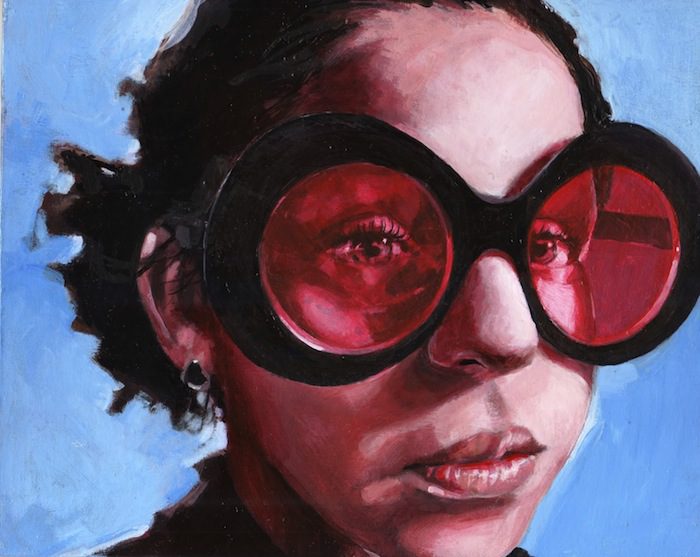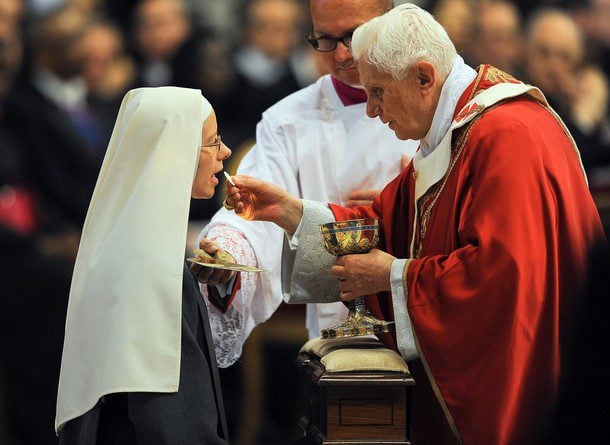We’ve all been there before; still high from the joy of the Mass when, in what can only be termed as a sabbatical buzz-kill, we are approached by the Christian who demands our attention and asks, “Why all the rules, rites and rituals, papist? Why all the custom and tradition? Surely God wants us to love him freely, to approach him personally, authentically, from our hearts: So why the pews, the candles, the kneeling and crossing of thyself?” Or perhaps the question was put to us a little more roughly, in the form of the Great Evangelical Misconception, “Why do you need a priest to get to God?” Or maybe we’ve approached the entire issue from the other end; sitting frigid in the pew, cynical about the lack of participation in our church, wishing more than anything that we could simply read our Bible in our rooms, out of strangling clothes. Whatever the case, the real question everyone’s revolting over is this: Why liturgy?
I aim to provide a satisfying answer for the Lutheran, the Anglican, the Presbyterian (I SPELLED THAT CORRECTLY ON THE FIRST TRY!), and the Methodist, who – though perhaps with less giddy thrill than the Catholic – have been known to don robes, light candles and otherwise engage in the scandalous following of form. If you are interested in knowing why Catholic liturgy is specifically awesome, I’ll give you a hint: it’s all in the Book of Revelation.
But the first problem confronted when answering the question is one of definition. I maintain that there are three definitions of liturgy, and the first is more of a reaction than a definition. It is what our minds immediately jump to: the kneeling, sitting, standing; the ritual, repetition, form; the structure of worship. If liturgy is taken in this sense, then I put forth that every denomination, even if they are called the Free-Thinking Disciples of non-Gender-Specific-Jesus-Figure Church of Happy, practices liturgy. Worship has a form, because humans have form, whether you like it or not. Whenever an action is repeated because it has been shown to be good, there you have liturgy. Therefore if – like the Evangelicals – you deny the liturgy of candles and incense, you do not escape liturgy, you merely trade it in for a new liturgy, one which – for whatever reason – tends to involve hand-holding prayer circles and Casting Crowns. Even if your Christianity is reading the bible in your room, that is your very liturgy, that is the structure of your worship.
Thus the Catholic, along with every liturgical Protestant, when asked: Why liturgy? has all sorts of witty, embittered and grumpy responses to pick from;”Because my liturgy is better than yours” or “Because Christian radio is a lousy replacement for the Communion” or simply “Why your own?” The question should really be, “Which liturgy?” and – not to make to much of a plug for Mother Church – but the Bible makes it pretty clear that the closer you’re getting to the liturgy of the Universal Church, the closer you are to getting to heaven’s, and vice versa.
This all gets wrapped up in a similar complaint often made by Baptists and fundamentalists, whose definition of liturgy is our second one, that of tradition, and is expressed against in the Great Fundamentalist Misconception, “Why do you use tradition over Scripture?” Ignoring the fact that Tradition compiled Scripture, and that they are in sync and one is not favored over the other, that question can be answered with another: “Why do you?” Every time you sit in a pew facing a preacher and say “Amen!” at important statements, there you practice tradition, for no scouring of the Bible will lend those particular habits authority. In fact, every time the preacher says that “Tradition must not be placed ahead of Scripture”, he practices tradition, for where can that dogma be found in Scripture?
I ask you, for a moment, to truly imagine a church without liturgy, without form. No thing, no matter how minuscule; not even the seating arrangement, could be repeated. Every service would have to be radically different; even the name of the church would have to change for every service. Perhaps even the location. Public worship without liturgy is congregational anarchy, that is to say, it does not exist. And even if that could be achieved, there would be an unspoken liturgy still; that the only rule is that there are no rules. Again, the value of my point is this; that the question is not whether or not to have liturgy, but whether that liturgy will be vague, modern and colloquial, or ancient and universal. In my next post I hope to explain why the latter is the way to go, and why it gets a bad rap.











